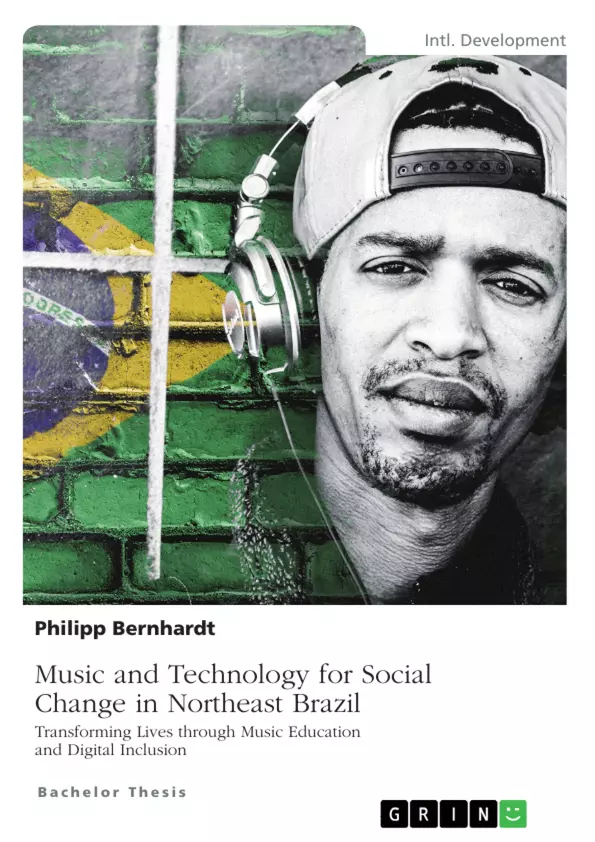Music brings people together, is spiritually uplifting and empowering. Among the 5000 languages that are spoken on planet earth, music is the only one that everyone understands.
Despite its very rich music culture, Brazil’s inequality remains one of the highest in the world and poverty levels in the Northeast are the highest in all of Latin America. This work suggests that the overall wellbeing and social development of northeastern Brazils poor population can be forged through improving investment and infrastructure of the cultural sector. Establishing a greater network of music schools and increasing access to ICT centers can fuel social change and transform poor people’s lives.
The project’s main objectives will be to analyze the youth’s present access to IT, which can be linked to music production skills and facilities, contact to independent labels, online networks and the creation of a fan and financial support base. This paper suggests that the Brazilian government underestimates young musicians and denies that they are a potential motor of increasing chances for socio-economic development in the Northeast of Brazil. A critical aspect of this work is the supposition that the government does not sufficiently address their services to the local needs of the poor.
The first section of this paper introduces the reader to the major facts and figures on Brazil. The second section presents Brazilian music, in particular the music scene from the Northeast. Moreover the impacts that the process of globalization has on music are examined aiming to understand the present shift cultural industries are undergoing.
The third section introduces latest trends in technology, particularly highlighting the importance of the Internet for sustainable development. A good ICT infrastructure has proven to play a crucial role for developing and emerging countries’ development endeavors, thus this section places Brazil’s fairly unevenly distributed national ICT network and unsatisfying access to computers into spotlight.
Finally, the fourth section presents four role models for successful implementations of social and digital inclusion projects by the means of music and technology from Recife, Caracas and Rio de Janeiro. These case studies highlight the impact music and technology can have on the livelihood of the poor, outlining the capability of transforming the lives of thousands of individuals, their families and their communities in developing/emerging countries.
Inhaltsverzeichnis (Table of Contents)
- Foreword
- Acronyms
- Introduction
- BRAZIL
- Country Profile
- MUSIC
- Brazilian Music
- Carnival
- The Globalization of Music
- TECHNOLOGY
- Music, Technology and Social Change
- The Digital Revolution
- Youth and ICT in Brazil
- SOCIAL CHANGE
- Transforming Peoples Lives
- Orquestra Criança Cidada
- Social Action for Music
- Afro Reggae
- Committee for Democratization and Information Technology
- Conclusion
Zielsetzung und Themenschwerpunkte (Objectives and Key Themes)
This research report explores the transformative power of music and technology in addressing social change, particularly in Northeast Brazil. The author aims to analyze how music education and digital inclusion can contribute to improving the lives of individuals and communities.
- The role of music as a force for social change in impoverished communities
- The impact of technology and digital inclusion on music education and social development
- The significance of Brazilian music and its cultural influence
- The potential of music and technology to address poverty and inequality
- Case studies of successful initiatives in music education and social action
Zusammenfassung der Kapitel (Chapter Summaries)
- Introduction: The introduction provides a broad overview of the research topic and its significance. It highlights the author's personal motivation and the importance of music and technology in addressing social issues, particularly in developing countries.
- BRAZIL: This chapter offers a comprehensive overview of Brazil's socio-economic context, focusing on its demographics, poverty rates, and challenges to social development. It sets the stage for the research's focus on Northeast Brazil.
- MUSIC: This chapter delves into the rich and diverse musical heritage of Brazil. It explores various genres, from popular music to traditional forms, and analyzes the cultural and social significance of music in Brazilian society. The chapter also touches on the globalization of music and its impact on Brazilian musical traditions.
- TECHNOLOGY: This chapter explores the intersection of music and technology, examining how advancements in technology are shaping musical creation, distribution, and consumption. It investigates the role of digital inclusion in promoting access to music education and fostering social change.
- SOCIAL CHANGE: This chapter focuses on the transformative power of music and technology in addressing social challenges. It analyzes case studies of successful initiatives in music education and social action, highlighting their impact on individual lives and communities. The chapter also explores the role of technology in facilitating social change and promoting digital literacy.
Schlüsselwörter (Keywords)
Music education, digital inclusion, social change, poverty reduction, inequality, Northeast Brazil, Brazilian music, technology, cultural heritage, community development, youth empowerment, social action, transformative potential.
Frequently Asked Questions
How can music drive social change in Northeast Brazil?
Music acts as an empowering tool that brings people together, providing spiritual upliftment and a platform for education and socio-economic development in poor communities.
What is the link between technology and music production in this region?
Access to ICT centers allows young musicians to learn production skills, connect with independent labels, and build online fan bases to support their careers.
Why is Northeast Brazil the focus of this study?
Despite Brazil's rich culture, the Northeast suffers from some of the highest poverty and inequality levels in Latin America, making it a critical area for social intervention.
What are some successful role models for digital inclusion?
The study highlights initiatives like the Orquestra Criança Cidadã, Afro Reggae, and the Committee for Democratization and Information Technology.
Does the Brazilian government support young musicians sufficiently?
The paper suggests that the government underestimates young musicians as a motor for development and does not sufficiently tailor its services to local needs.
- Quote paper
- Philipp Bernhardt (Author), 2009, Music and Technology for Social Change in Northeast Brazil, Munich, GRIN Verlag, https://www.grin.com/document/540633



